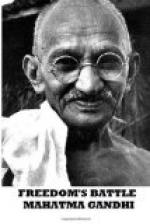of Indians are slowly sinking to lifelessness.
Little do they know that their miserable comfort represents
the brokerage they get for the work they do for the
foreign exploiter, that the profits and the brokerage
are sucked from the masses. Little do they realise
that the Government established by law in British
India is carried on for this exploitation of the masses.
No sophistry, no jugglery in figures can explain away
the evidence the skeletons in many villages present
to the naked eye. I have no doubt whatsoever
that both England and the town dwellers of India will
have to answer, if there is a God above, for this crime
against humanity which is perhaps unequalled in history.
The law itself in this country has been used to serve
the foreign exploiter. My unbiased, examination
of the Punjab Martial Law cases had led me to believe
that at least ninety-five per cent. of convictions
were wholly bad. My experience of political cases
in India leads me to the conclusion that in nine out
of every ten the condemned men were totally innocent.
Their crime consisted in love of their country.
In ninety-nine cases out of hundred justice has been
denied to Indians as against Europeans in the Court
of India. This is not an exaggerated picture.
It is the experience of almost every Indian who has
had anything to do such cases. In my opinion
the administration of the law is thus prostituted consciously
or unconsciously for the benefit of the exploiter.
The greatest misfortune is that Englishmen and their
Indian associates in the administration of the country
do not know that they are engaged in the crime I have
attempted to describe. I am satisfied that many
English and Indian officials honestly believe that
they are administering one of the best systems devised
in the world and that India is making steady though
slow progress. They do not know that a subtle
but effective system of terrorism and an organised
display of force on the one hand and the deprivation
of all powers of retaliation of self-defence on the
other have emasculated the people and induced in them
the habit of simulation. This awful habit has
added to the ignorance and the self-deception of the
administrators. Section 124-A under which I am
happily charged is perhaps the prince among the political
sections of the Indian Penal Code designed to suppress
the liberty of the citizen. Affection cannot be
manufactured or regulated by law. If one has no
affection for a person or thing one should be free
to give the fullest expression to his disaffection
so long as he does not contemplate, promote or incite
to violence. But the section under which mere
promotion of disaffection is a crime. I have
studied some of the cases tried under it, and I know
that some of the most loved of India’s patriots
have been convicted under it. I consider it a
privilege therefore, to be charged under it.
I have endeavoured to give in their briefest outline
the reasons for my disaffection. I have no personal




